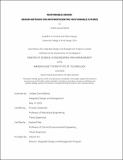| dc.contributor.advisor | Gustowski, Timothy | |
| dc.contributor.advisor | Plata, Desiree | |
| dc.contributor.author | Quirós Balma, Andrea | |
| dc.date.accessioned | 2023-07-31T19:24:33Z | |
| dc.date.available | 2023-07-31T19:24:33Z | |
| dc.date.issued | 2023-06 | |
| dc.date.submitted | 2023-06-23T19:58:58.289Z | |
| dc.identifier.uri | https://hdl.handle.net/1721.1/151231 | |
| dc.description.abstract | Finding a state of sustainability in which present and future human generations may have equal opportunity in perpetuity is an anthropocentric pursuit. It requires intergenerational equity in everything we do, including how we design the products, systems, and companies we build and use. Responsible Design is a new methodology that helps provide the structure designers need to develop sustainable solutions. It is an evolved version of Human Centered Design, a methodology that although well-intentioned can deliver solutions with dangerous effects on the environment. Responsible Design uses frameworks that consider the current climate change crisis across scales, the ethical concerns it poses across generations, and the viability of solutions across environmental, social, and economic dimensions. | |
| dc.publisher | Massachusetts Institute of Technology | |
| dc.rights | In Copyright - Educational Use Permitted | |
| dc.rights | Copyright retained by author(s) | |
| dc.rights.uri | https://rightsstatements.org/page/InC-EDU/1.0/ | |
| dc.title | Responsible Design: Design Methods for Anthropocentric Sustainable Futures | |
| dc.type | Thesis | |
| dc.description.degree | S.M. | |
| dc.contributor.department | System Design and Management Program. | |
| mit.thesis.degree | Master | |
| thesis.degree.name | Master of Science in Engineering and Management | |
